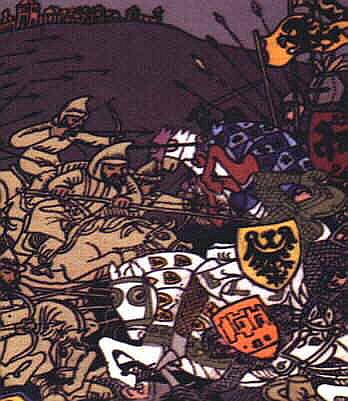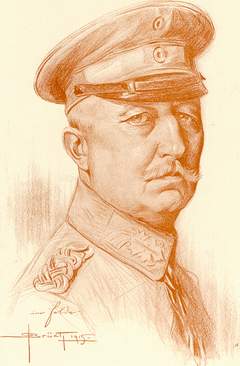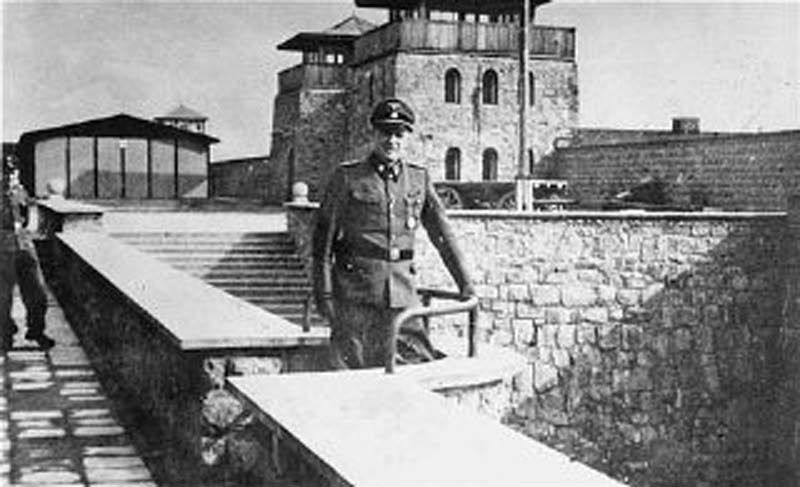
April 9

0193 In the Balkans, the distinguished soldier Septimius Severus is proclaimed Roman Emperor by the army in Illyricum. "Lucius Septimius Severus restored stability to the Roman empire after the tumultuous reign of the emperor Commodus and the civil wars that erupted in the wake of Commodus' murder. However, by giving greater pay and benefits to soldiers and annexing the troublesome lands of northern Mesopotamia into the Roman empire, Septimius Severus brought increasing financial and military burdens to Rome's government. His prudent administration allowed these burdens to be met during his eighteen years on the throne, but his reign was not entirely sunny. The bloodiness with which Severus gained and maintained control of the empire tarnished his generally positive reputation..."

1241 The Battle of Liegnitz: Duke Henry II of Silesia, also known as Henry the Pious, marches out of his city of Liegnitz to meet the dreaded Mongols, or Tartars, as they were then called by the Europeans. The invaders from the east had already attacked Lublin and Sandomir. Henry's army is the last left to oppose the Tartars in Poland. As he rides through the city, a stone falls from the roof of St. Mary's Church and narrowly misses killing the duke. The people take it for an omen of misfortune and the Mongols win.
1388 Battle of Nofels: Glarius Swiss defeats the Austrian Habsburg army.
1454 In Lodi, Italy, the Italian states of Milan, Florence and Venice sign the Peace of Lodi, recognizing each other's status.
1483 The young Edward V accedes to the throne on the death of Edward IV. He will never be crowned and will disappear 75 days later, presumably murdered.
1667 The first public art exhibition is held at the Palais-Royale in Paris.

1682 French explorer Robert La Salle discovers the mouth of the Mississippi River and claims it for France. ...he became obsessed with discovering an elusive route to the orient through central North America. Over the years, some people believed him as visionary (some people even questioned his sanity) because of his obsession with becoming a famous discoverer.La Salle's travels didn't seriously begin until 1673 when he became apart of the comte de FRONTENAC'S policy of western commercial and military expansion of New France. He was given the command of Fort Frontenac, as well as put in charge of the fur trade in that area. Robert traveled to Lake Michigan in 1679, Illinois county in 1680, and from the Illinois River down to the mouth of the Mississippi in 1682. Four new forts were established during La Salle's travels: Niagara (1679), Saint Joseph and Crevecoeur (1680) and St. Louis (1682). Profits from the fur trade were intended to fund the explorations, but because of political set backs, bad luck, and bad organization Frontenac went into debt. Frontenac withdrew his funding of La Salle's travels in 1682, therefore La Salle had to search for another means of funding, which he found two years later from France. France expected La Salle to lay claim to Louisiana (stretching from Illinois county to the Gulf of Mexico and into New Spain [Mexico]) In return he was supplied with ships and men so he could sail into the Gulf of Mexico, invade Spanish territory, and empty mines that were thought to be there. This took place in 1684 and was also a failure. La Salle did not find the Mississippi delta from the Gulf of Mexico. He was eventually murdered by mutineers in Texas on March 19th, 1687."

1731 The War of Jenkins' Ear: British Captain Robert Jenkins loses an ear to a band of Spanish brigands, starting a war between Britain and Spain. "It grew out of the commercial rivalry of the two powers and led to involvement in the larger War of the Austrian Succession. The incident that gave the name to the war occurred in 1731 when, according to Robert Jenkins, master of the ship Rebecca, he had his ear cut off by Spanish coast guards. English smuggling and resentment at exclusion from the Spanish colonial trade caused the war, but Jenkins's story in the House of Commons (1738-cartoon above), reinforced by the showing of his carefully preserved ear, had a tremendous propaganda effect and forced the reluctant Sir Robert Walpole to declare war. The hostilities with Spain up to 1741 were marked only by the naval engagements of Admiral Edward Vernon in the West Indies."
1747 The Scottish Jacobite, 12th baron Lord Lovat, is beheaded on Tower Hill in London, for high treason; the last man to be executed this way in Britain.

1770 Captain James Cook discovers Botany Bay in Australia. "...Cook mapped the complete New Zealand coastline, making only minor mistakes (such as calling Banks Peninsula an island, and thinking Stewart Island was part of the South Island). He also discovered Cook Strait, which separates the North Island from the South Island, and which Tasman had not guessed at. Next, he went on to Australia, where he discovered its east coast. The site of Cook's first landing, at Kurnell on Botany Bay, was intended to be the site of the first British colony in Australia. However, when Captain Arthur Phillip arrived with the First Fleet in 1788, he felt that Botany Bay was unsuitable, and sailed a short distance northwards to Port Jackson, for the establishment of Sydney. Botany Bay was indeed the site of one of the earliest European contacts with Australian Aborigines, and the first European sightings of Australian flora and fauna; the name Botany Bay was chosen to reflect the diverse range of flora found there. Cook also discovered..."
1806 Birth: Isambard Kingdom Brunel, engineer, designer of the first transatlantic steamer.

1807 Death: John Opie, infant prodigy, painter, illustrator.
1833 Peterborough, New Hampshire, opens the first municipally tax-supported public library.
1838 The National Galley opens in London.
1850 Death: William Prout, physician, chemist.
1859 Realizing that France had encouraged the Piedmontese forces to mobilize for invading Italy, Austria begins mobilizing its army also.
1859 Samuel Clemens becomes a licensed river boat pilot on the Mississippi River.

1861 Birth: Charles Holroyd, painter, etcher.
1865 US Civil War: Federals capture Ft Blakely, Alabama.

1865 US Civil War: At Appomattox, Virginia, Confederate General Robert E. Lee surrenders his 28,000 troops to Union General Ulysses S. Grant, effectively ending the American Civil War. Forced to abandon the Confederate capital of Richmond, blocked from joining the surviving Confederate force in North Carolina, and harassed constantly by Union cavalry, Lee has no other option. In retreating from the Union army's Appomattox Campaign, the Army of Northern Virginia had stumbled through the Virginia countryside stripped of food and supplies. At one point, Union cavalry forces under General Philip Sheridan had actually outrun Lee's army, blocking their retreat and taking 6,000 prisoners at Sayler's Creek. Desertions were mounting daily, and by April 8 the Confederates are surrounded with no possibility of escape. On this day, Lee sends a message to Grant announcing his willingness to surrender. The two generals meet in the parlor of the Wilmer McLean home at one o'clock in the afternoon. Lee and Grant, both holding the highest rank in their respective armies, had known each other slightly during the Mexican War and exchange awkward personal inquiries. Characteristically, Grant arrives in his muddy field uniform while Lee turns out in full dress attire, complete with sash and sword. Lee asks for the terms, and Grant hurriedly writes them out. All officers and men are to be pardoned, and they will be sent home with their private property, most important, the horses, which can then be used for a late spring planting. Officers will keep their side arms, and Lee's starving men will be given Union rations. Shushing a band that had begun to play in celebration, General Grant told his officers, "The war is over. The Rebels are our countrymen again." Although scattered resistance will continue for several weeks, for all practical purposes the Civil War has come to an end. (Bradley)

1865 Birth: Erich Ludendorff, German general. General Ludendorff was the virtual dictator of Germany during the final years of WWI. During the Munich Putsch on November 9, 1923, he walked with Hitler at the head of the Nazi column and was quickly arrested. Ludendorff was found not guilty and returned to home in the country. According to Hitler, Ludendorff's staunch opposition to the Catholic Church caused their split after the Putsch. Ludendorff and his second wife, Mathilde von Kemnitz, published a number of viciously anti-Semitic, anti-Freemason and anti-Catholic publications right up until the time of his death. It is said that Ludendorff warned Hindenburg against appointing Hitler chancellor.
1865 Birth: Charles Proteus Steinmetz, in Germany, electronics pioneer; AC.
1866 Over Republican President Andrew Johnson's veto, the US Congress passes the Civil Rights Bill of 1866, which grants blacks the rights and privileges of American citizenship and forms the basis for the 14th Amendment to the US Constitution.

1869 The Hudson Bay Company cedes its territory to Canada.
1870 The American Anti-Slavery Society dissolves.
1872 S.R. Percy of New York City receives a patent for dried milk.
1879 Birth: Claude William Dukenfield, known as W.C. Fields, in Philadelphia, comedian and actor.

1879 Birth: Gerald Festus Kelly, artist.

1882 Death: Dante Gabriel Rossetti, poet, pre-Raphaelite painter.
1900 Boer War: British forces route the Boers at Kroonstadt, South Africa.
1903 Birth: Gregory Pincus, inventor of the birth control pill.

1908 Birth: Victor Vasarely, painter.

1909 Death: Charles Conder, artist.
1911 Birth: Lord Deramore, architect.
1914 The first full-color film, The World, The Flesh, and the Devil, is shown in London.
1916 WW1: The third German offensive at Verdun strikes both sides of the salient, but is checked by May 19.
1917 WW1: The long-awaited Allied Offensive (the Nivelle Offensive) begins when British troops, following a heavy bombardment and gas attack, assault the German Sixth Army positions near Arras and Canadian troops assault Vimy Ridge. British air superiority is rapidly achieved.
1917 WW1: In Russia, widespread popular opposition to the war causes the Petrograd Soviet to repudiate annexationist ambitions (March 27, O.S.).
1918 Latvia proclaims its independence from Russia.
1918 WW1: During the Battle of Lys, German troops again strike the British sector, this time in Flanders, threatening the important rail junction of Hazebrouck and the Channel ports.
1918 WW1: The British are forced to withdraw from Ypres to Armentieres.
1919 Birth: John Presper Eckert, co-inventor of ENIAC, first electronic computer.
1921 The Russo-Polish conflict ends with the signing of the Riga Treaty.
1933 Church and Reich: Hermann Goering flies directly to Rome from Berlin.
1933 Church and Reich: After Kaas and Papen arrive in Rome, Kaas is the first to be received by Secretary of State Pacelli.
1934 Austria bans dissemination of Pan-German Association propaganda.
1937 The Gestapo seizes all B'nai B'rith lodges in Germany.
1939 On this Easter Sunday, famed African-American contralto Marian Anderson gives a free open-air concert before more than 75,000 people from the steps of the Lincoln Memorial in Washington DC, after the Daughters of the American Revolution had denied her use of Constitution Hall because of her race.

1940 WW2: Germany invades Norway and Denmark, beating the Franco-British invasion by only twelve hours. During the next several days Norwegian shore batteries and warships sink three German cruisers (including the 10,000 ton Blucher), 10 destroyers and 11 troop transports. A battleship and three more cruisers are damaged so badly they have to be pulled out of service. "...within the next hour (by about 12:30am on the 9th) the entire German force ran past the Norwegian batteries in the outer Fjord, helped by a sea fog which moved in, clinging to the water's surface and making it difficult for the Norwegian searchlights to pinpoint targets, although silhouettes of the advancing vessels were intermittently seen. The batteries at Rauoey opened fire on the Germans, but only for a short time and with no apparent effect. Bolaerne didn't fire at all. After clearing the outer batteries the German force splits up with Torpedoboot ALBATROS and Torpedoboot KONDOR, plus two Raumboot, peeling off to attack the naval base at Horten, and two more pairs of Raumboot sent against Rauoey and Bolaerne respectively (most of these Raumboot had landing parties aboard), while the big ships with the rest of the force proceed direct to Oslo. At about 3:30am the main German force reached the Oskarsborg Narrows and the forts there, with Kreuzer BLUCHER in the lead. The Norwegian 280mm battery on South Kalholmen Island opened fire first, with two armor-piercing rounds both scoring hits, one on the BLUCHER's fire-control tower, and the other just behind the bridge. In fact, the range was so close that literally every shot the Norwegians fired at the BLUCHER was a hit. The Norwegian 150mm battery then began to plaster the ships bridge with shells, while the 280mm guns switched their fire to the waterline. BLUCHER was down to five knots and burning fiercely within a matter of minutes, without being able to make an effective reply. As the crippled ship came abreast of the Kalholmen islands, the land-based torpedo tubes on North Kalholmen administer the coup de grace, in the form of two torpedoes, one of which..."
1940 WW2: A German parachute battalion, the first to be used in war, captures the airfield at Oslo, while transport planes drop more troops and guns.
1940 WW2: Copenhagen, Denmark, is taken by two German divisions in less than 12 hours, and the Germans begin a policy of cooperation and negotiation with the Danish government.
1940 WW2: The Danish-German Agreement is signed, resulting in Denmark's Jews being left unmolested for a time.

1941 WW2: Yugoslav armies are crushed by German Blitzkrieg. German troops enter Salonika. In a speech, Winston Churchill justifies the necessity of answering Greece's appeal for help, calls to America for increased help, saying that main battle is that of the Atlantic.

1942 WW2: American and Philippine defenders on Bataan capitulate to Japanese forces. The surrender is followed by the notorious Bataan Death March, which will claim nearly 10,000 lives.
1942


1945 Resistance: Admiral Wilhelm Canaris, former head of the Abwehr, General Hans Oster, and Pastor Dietrich Bonhöffer (Bonhoeffer, above) are hanged at Flossenbuerg concentration camp. Note: Dohnanyi is killed at the Sachsenhausen Camp, one of four members of Bonhöffer's immediate family to die at the hands of the Nazi regime for their participation in the small Protestant resistance movement: Two sons (Dietrich and Klaus) and two sons-in-law (Hans von Dohnanyi and Rüdiger Schleicher).

1945 Holocaust: The Germans begin evacuating Mauthausen concentration camp.
1945 Diary of Leon Gladun: I haven't written much since January. The whole time (December, January, February, March) we were defending our positions in the area of Faenza and Saladino along the Senio River. We were here right up to Easter and the offensive on Bologna. Our reserve time near Saladino passed calmly, almost a vacation. We've begun the offensive. In succession we take Solarolo, Mordano, il Ponte, and finally we are near Bologna.

1945 WW2: The Red Army is repulsed at the Seelow Heights on the outskirts of Berlin.
1945 WW2: The USS Liberty, with a cargo of aerial bombs, explodes in Bari harbor, Italy, killing 360.
1952 A popular uprising takes place in Bolivia.
1959 Death: Frank Lloyd Wright, US architect, at 89.
1959 NASA announces the selection of America's first seven astronauts: Scott Carpenter, Gordon Cooper, John Glenn, Gus Grissom, Wally Schirra, Alan Shepard and Donald Slayton. The seven men, all military test pilots, have been carefully selected from a group of 32 candidates to take part in Project Mercury.
1963 British statesman Winston Churchill is made an honorary US citizen, posthumously.
1966 A statue of Winston Churchill is dedicated at the British Embassy in Washington DC.
1969 The supersonic aircraft Concorde 002 makes its maiden flight, from Filton, Bristol to Fairford in England.
1974 India, Pakistan and Bangladesh sign an accord on the return of prisoners of war.
1976 The United States and the Soviet Union agree on the size of nuclear tests for 'peaceful use.'
1977 The Spanish Communist Party is legalized after a 38-year ban.
1979 The US government declares the crisis over at the Three Mile Island nuclear plant in Pennsylvania.
1981 The US submarine George Washington rams the Japanese freighter Nisso Maru.
1983 The sixth space shuttle mission, Challenger 1, returns to Earth.
1988 The United States imposes economic sanctions on Panama.
1989 Troops clash with nationalist demonstrators in the capital of the Soviet republic of Georgia.
1991 Georgia votes to secede from the USSR.
1992 John Major is elected British prime minister.
1992 Former Panamanian ruler Manuel Noriega is convicted by a federal jury in Miami of eight drug and racketeering charges.
1995 Two suicide bombings on buses in the Gaza Strip kill seven Israelis and an American college student.
1996 Former US Representative Dan Rostenkowski, D-Illinois, once one of America's most powerful lawmakers, pleads guilty to two criminal charges in a deal with prosecutors that calls for a 17-month prison term.
1996 The United States begins evacuating Americans from Liberia.
1997 A government of unity is launched in Angola, three years after the end of the country's 19-year civil war, with the seating of 70 members of the rebel UNITA party in parliament.
1999 The president of the African nation of Niger, Ibrahim Bare Mainassara, is assassinated, reportedly by members of his own guard. Following his death, a military junta led by the commander of the presidential guards takes power.
2001

2002

2002 As the investigation into the Enron Corporation failure moves forward as David Duncan, a former partner with Arthur Andersen, the accounting firm for Enron, pleads guilty to obstruction of justice.
2003 Iraqis dance upon a toppled statue of Saddam Hussein as Baghdad tastes its first day of freedom.
2004

2005

2005

2005

Visit:




 Visit:
Visit:

Click Here to email the History: One Day At a Time webmaster.